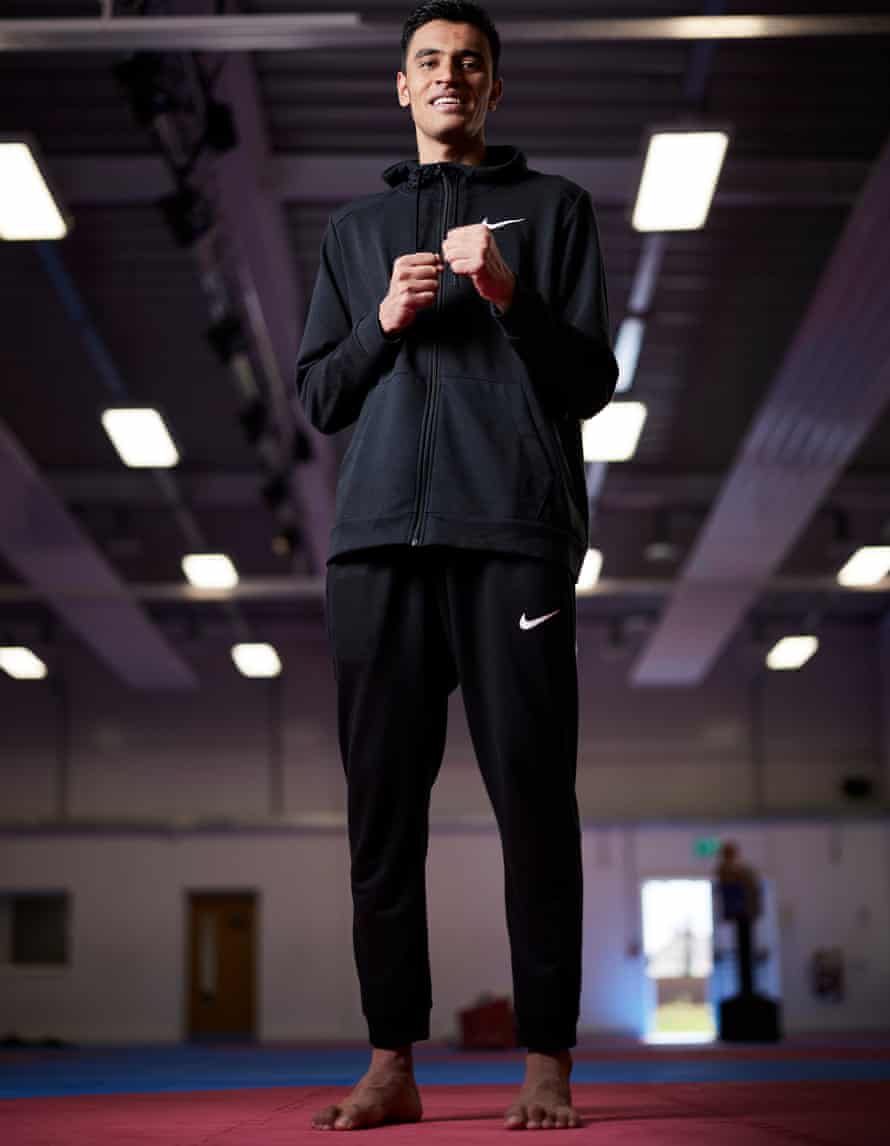
Farzad Mansouri settles into his stance and starts to bounce on his toes before unleashing a spinning kick, the precise but powerful blow thundering into the padded midriff of his training partner. The thud of impact, accompanied with a roar, is still reverberating in the training hall of the National Taekwondo Centre in Manchester when he returns to his stance, ready to go again. It is here that Mansouri finds himself truly in his element.
“It’s so good to be training again after so long,” he says. “I feel great to be here.” In July 2021 Mansouri, the Afghan champion, represented his country at the Tokyo Olympics, with the honour of parading the Afghanistan flag during the opening ceremony. It was a moment Mansouri was immensely proud of. It was also a moment that he soon came to regret.
As US forces withdrew from Afghanistan, the Taliban swept to power across the country. Mansouri’s father worked for the Afghan government and his family is Tajik, a group who have been historically suppressed by the Taliban. He feared that his high profile and affiliation with the fallen regime would lead to his family being targeted. A month after Mansouri had paraded through the Japan National Stadium, he and his family were among the tens of thousands of Afghans who made their way to the Hamid Karzai international airport, hoping to be evacuated during one of the largest airlifts in history.
After an excruciating 24-hour wait outside the airport, Mansouri and five of his family members were ushered on to a flight in the early hours of 24 August bound for the UAE. It was during his evacuation that GB Taekwondo was made aware of Mansouri’s story.
“Farzad clearly has the skills and ability to be a champion, but no longer had the recourse to train or to compete,” says Gary Hall, the performance director for the Great Britain taekwondo team. “His story resonated with us. If we could help in any way shape or form, we would.”
GB Taekwondo offered Mansouri the chance to live and train at the National Taekwondo Centre in Manchester alongside the likes of Lutalo Muhammad, Jade Jones and Bradly Sinden. But then began the notoriously complicated process of getting into the UK, and with it an agonising wait. Even though Mansouri has a brother, Farhad, who lives in Reading, having travelled to the UK as a refugee in 2001, a family reunion was not permitted.
As lawyers got to work trying to find a solution, he and his family were housed in a single room in a refugee camp in Abu Dhabi. Covid restrictions and tight security meant that they were allowed out to exercise for only a couple of hours a day. With the Olympic rings emblazoned on the clothes he took with him, he had to find a way to keep moving. “In Japan, I saw how fit the other athletes were. I had to get to the next Olympics, so I couldn’t allow the camp to affect me. I had to be fit when I arrived, wherever I was going,” Mansouri says.
He designed a training schedule in line with what he was used to in Afghanistan. The camp leaders allowed him extra space and time to work out. So he used the limited facilities and recruited his brother to help him train, documenting it on his Instagram page.
In April, after eight months in the refugee camp, he finally got the news that he would be allowed into the UK. He was to travel on an international sportsperson visa. This was bittersweet news, however, as the visa doesn’t permit the rest of his family to travel with him. “My parents are elderly, they are all in one room, unable to go outside for most of the day. It’s like a prison there.”

Mansouri had to leave behind both his parents, his brother and sister and his nephew. “I hope we can be together in one place one day. It doesn’t matter where it is.” On 1 May, he flew to Manchester airport where he was met by Hall and his brother, Farhad. Since then Mansouri has been settling into life in Manchester. He trains five days a week with access to nutritionists, performance psychologists and social support, a far cry from what he was used to in Kabul, let alone Abu Dhabi.
“It’s amazing. The training is a lot tougher here. It’s very different from what I am used to. It will take me some time to feel at home,” he says.
Sign up to The Recap, our weekly email of editors’ picks.
For elite athletes, eight months without professional guidance and competition is a long time. But from his initial sessions with Mansouri, Hall doesn’t think the hiatus will be a problem. “He has kept to a really good level of fitness … most people, particularly with the mental health challenges, would just try to survive in that scenario,” says Hall. “I have no doubt he will be winning medals.”
Mansouri’s sights are set on Paris 2024, although how he will compete and for whom is unclear. If the Taliban prevent Afghan athletes from taking part, Mansouri will be faced with yet more challenges: “For now it is very difficult. But day-to-day it’s getting better.”
